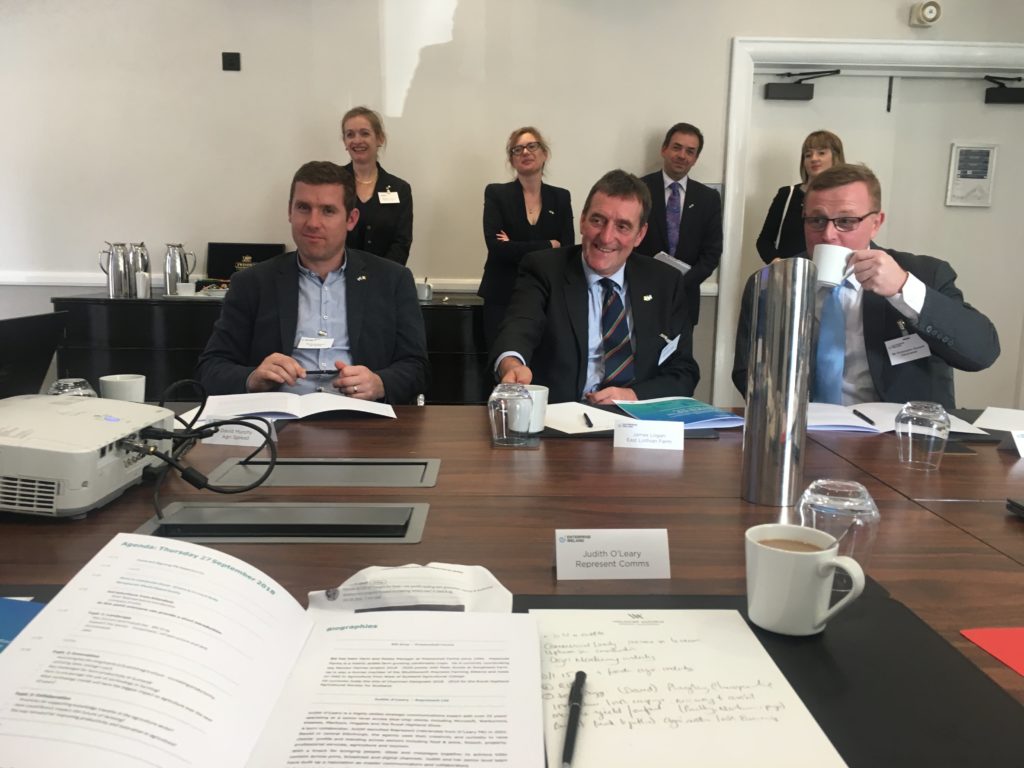As an agency working across Ireland and Scotland in the agritech sector, Represent was involved in the recent Enterprise Ireland trade mission where key industry representatives from both sides of the Irish sea met to debate the burning issues facing the industry.
Irish manufacturers including Dairy Master, Herdwatch, Abbey Machinery and Agri Spread discussed with Scottish industry experts on the opportunities to grow their market share in Scotland, as well as exploring what the industry can do to drive innovation and collaboration.
Without doubt the future of the UK-Irish trading relationship post-Brexit was on everyone’s minds. Discussions centred around what steps can be taken to insulate farmers and businesses from the effects of a no-deal, hard Brexit or even a re-vote as some participants predicted.
Accents apart, what was clear were the many similarities between the two countries. The conversation flowed freely with participants finding mutual ground and a real desire to help each other’s businesses succeed. This generosity of spirit and both nation’s natural affinity with farming underlies why Scotland and Ireland are a natural first export market.
The Chair, Bill Gray from Prestonhall Farms, guided discussions regarding the challenges of a lack of skilled workforce, an issue that concerned delegates. To tackle this, a number of farmers and manufacturers are looking to Robotics to play a role in the future of the agriculture sector. David Murphy from Agri Spread is looking to New Zealand to see how technology has transformed large-scale farming – a trend that is becoming more and more prevalent both in the UK and Ireland.
James Greevy from Herdwatch, the farming App that saves dairy and beef farmers time and money on labour-intensive processes such as Calf Birth Registration and Herd Management, discussed the need to drive efficiency. He also examined how new technology must be adopted in order to meet the challenges of increasing efficiency, reducing costs and achieving growth.
Ben Walker from Livingston James discussed how the sector could learn from other industries facing change. He used banking as an interesting case study on how market disruption can create a force for good, where the fittest can succeed in times of great turbulence.
Chris Howarth from Dairy Master talked about the importance of creating a strong sales chain to deliver higher standards of customer service built on upskilling distributors to better service clients. Investment was a key take out from Dairy Master’s model both in terms of production and also delivery and service to customers.
The power of the supermarket was discussed at length, with the cost of production not being reflective on the price paid to farmers. Discussions arose on how to add value to primary produce and the importance of building individual brands.
This led on to the growth of synthetic biology, with Judith O’Leary from Represent discussing the growth of the sector, which will be worth in the region of $16b by the end of the year.
Michael O’Grady from Abbey Machinery made some very interesting points. He is from a business that is actively embracing change, using it as a catalyst to steel a march on competition with a focus on making his farming customers more efficient by providing machinery that increases production and saves time. This was a common theme that all agreed would have the desired cut-through with time-pressed farmers.
However, for some it is the pace of innovation that sometimes leads to increased anxiety, with busy farmers and manufacturers struggling to keep up with changes that have a real impact on their business. Nina Clancy from RSABI talked about the impact of this coupled with external factors such as weather that are damaging the wellbeing of the people we rely on to feed the world.
Continuous education throughout farming careers was cited as a way in which we can ensure no farmer gets left behind. This was echoed by John Sleigh of the Farmers Journal. John talked about the need to inspire and educate the farmer in a way that’s accessible and mindful of the plethora of meetings organised by well-meaning organisations that fail to deliver any real value.
The importance of benchmarking and knowledge transfer was discussed, with Bill Gray, also a Director of The Royal Highland and Agricultural Society of Scotland, highlighting the need for international travel in order to inspire our young people to go further-a-field. This will help them study new developments and bring that learning back to our shores. Closer to home, monitor farms – one of which Bill is participating in at present- were seen as hugely important in sharing best practices and learning from each other.
Shauna Higgins highlighted what Enterprise Ireland is doing to support innovation in the sector and support businesses that are looking to grow – one such example was the trade mission.
Bill concluded the round table by thanking everyone for their contribution and with business cards swapped we can see that connections made at this event will be cultivated over the coming months in the agritech sector.
Are you a business in the agritech sector looking for help with PR & digital? Represent are here to help. Don’t hesitate to get in touch to discuss how we can work together.


